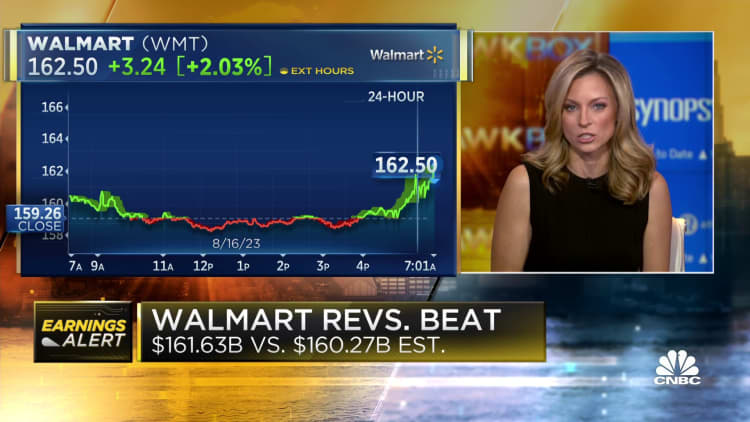[ad_1]

Walmart on Thursday raised its full-year forecast, as the discounter leaned on its low-price reputation to draw grocery customers and drive online spending.
The big-box retailer beat Wall Street’s expectations for sales and profits. E-commerce sales for Walmart U.S. also jumped 24%.
Walmart said it now expects full fiscal-year consolidated net sales to increase by about 4% to 4.5%. It said adjusted earnings per share for the year will range between $6.36 and $6.46. That compares with its prior guidance for consolidated net sales gains of 3.5% and an adjusted earnings per share range of between $6.10 and $6.20.
In a CNBC interview, Chief Financial Officer John David Rainey said Walmart saw “modest improvement” in sales of big-ticket and discretionary items like electronics and home goods during the quarter. Sales of those products have been weaker for more than a year as Americans spend more on necessities like food.
He described the consumer as “choiceful or discerning” and said seasonal moments, such as the Fourth of July holiday and back-to-school, have helped drive sales.
The company’s shares were up less than 1% in premarket trading.
Here’s what the company reported for the three-month period ended July 31 compared with what analysts were expecting, according to consensus estimates from Refinitiv:
- Earnings per share: $1.84 adjusted vs. $1.71 expected
- Revenue: $161.63 billion vs. $160.27 billion expected
Walmart’s net income for the fiscal second-quarter jumped by 53% to $7.89 billion, or $2.92 per share, compared with $5.15 billion, or $1.88 per share a year earlier.
Customers visited Walmart’s stores and website more often and bought more when they did. Transactions increased by 2.9% and the average ticket rose by 3.4% for Walmart U.S.
Same-store sales for Walmart U.S. grew by 6.4% in the second quarter, excluding fuel, compared with the year-ago period. That’s higher than the 4.1% increase that analysts expected, according to FactSet.
At Sam’s Club, same-store sales rose 5.5%, excluding fuel, in line with analysts’ expectations.
Walmart’s online sales in the U.S. grew, as customers bought more items from the company’s growing third-party marketplace and placed more orders for store pickup and delivery.
“It really shows that the value proposition for Walmart is much, more than just low prices or value. It’s convenience today,” Rainey said. “And so we’re leaning heavily into that and really both aspects of this part of our business.”
Walmart has stood apart from other retailers such as Target, which have struggled with softer sales. It is better insulated from shoppers’ changing tastes and reactions to economic factors like high inflation because it sells more everyday staples as the nation’s largest grocer.
Rainey said he continues to be surprised by consumers and their “willingness to spend.” But he added they still want to to save money.
Customers are buying more food from Walmart’s private brands, which typically cost less. In the grocery department at Walmart U.S., sales of private labels rose 9% year over year. Those brands make up 20% of Walmart’s total U.S. sales.
Shoppers may also be looking to save by making more of their own meals rather than dining out. Walmart has noticed “a little bit of a shift to cook from home,” Rainey said. It saw an uptick in sales of prepared meals and tools to cook with, such as blenders and mixers.
While general merchandise trends are improving, sales are still down by low single-digits year over year, he said.
Walmart has gained momentum with new revenue streams, too, including selling more advertisements and convincing more shoppers to sign up for its membership program, Walmart+. Those higher margin businesses are a major reason why CEO Doug McMillon has said he expects profits to grow faster than sales over the next five years.
That upward trajectory continued in the most recent quarter. Sales for Walmart Connect, the company’s advertising business in the U.S., grew 36% year over year.
[ad_2]
Source link
